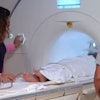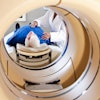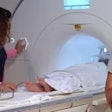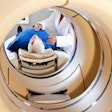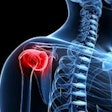CHICAGO - Canon Medical Systems unveiled two new CT scanners and a wide range of other offerings in its booth at RSNA 2023.
CT
Canon introduced two two new scanners, Aquilion One/Insight Edition and Aquilion Serve SP.
The company's new flagship scanner, Aquilion One/Insight Edition is a premium system that pairs the company's Precise IQ Engine (PIQE) deep-learning reconstruction technology with Instinx -- translating into more efficient exams, according to Canon. It produces super-resolution 1024 matrix images for cardiac and body exams and features a 0.24-second rotation speed, which allows for one-beat scanning in patients with high heart rates. The company also highlighted hardware upgrades to this scanner, including its CoolNovus x-ray tube for heat dissipation and its Canon's PureInsight detector for reduced noise.
Aquillion Serve SP features an 80-cm wide-bore gantry, two touch screens, and built-in cameras that support automated patient positioning, the company said. Both scanners use the company's Instinx workflow software, released in August with Canon's Aquilion Serve. Instinx combines AI-enabled automation to support efficient and safe CT exams. Both Aquilion One/Insight Edition and Aquilion Serve SP are currently pending U.S. Food and Drug Administration (FDA) 510(k) clearance.
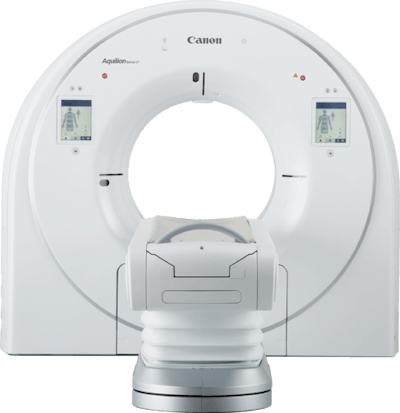 Canon's Aquilion Serve SP. Image courtesy of Canon.
Canon's Aquilion Serve SP. Image courtesy of Canon.
The company also noted that its Advanced intelligent Clear-IQ Engine (AiCE) deep learning software – which supports high-quality imaging at low radiation doses -- has been incorporated into all of its CT systems.
Finally, Canon highlighted its new AI software package, called End-to-End CT Workflow Automation. In addition to Instinx, the package includes what the company calls Automation Platform, which makes use of deep learning to make workflows more efficient, and Vina Analytics, a CT protocol management tool that helps users review, compare, approve, distribute, and track history of exam protocols.
MRI
Canon highlighted AI technology in the MRI section of its booth. The company displayed its Precise IQ Engine (PIQE) deep-learning reconstruction software for MR imaging, currently cleared by the U.S. Food and Drug Administration (FDA) for brain and knee indications on Canon's Vantage Galan 3T system. PIQE increases matrix size, removes noise, produces sharp anatomical images, and generates high spatial resolution images from low resolution ones, according to Canon. It also allows users to triple the matrix in both in-plane directions.
Also for MRI, Canon highlighted its AiCE deep learning software and its Iterative Motion Correction tool, which reduces motion artifacts, it said. Finally, Canon showcased its Remote Assist MR console, which provides remote, real-time protocol adjustment assistance.
Ultrasound
As for ultrasound, Canon highlighted new offerings to facilitate communication between radiologists and sonographers. The tools, called ApliCam and ApliGate, offer real-time visualization of the anatomical position of the ultrasound as it's being performed.
ApliCam matches video of the transducer's position during scanning to the ultrasound clip saved on the system, which allows a remotely-based radiologist to see the anatomy being scanned in combination with the ultrasound-acquired diagnostic images, Canon said. ApliGate uses Microsoft Teams or Zoom to share the ultrasound screen in real-time with remotely-based radiologists or sonographers.
Both tools are HIPAA compliant, according to Canon: ApliCam uses smart facial recognition to blur patient and operator faces and ApliGate hides patient information when screen sharing.
In its booth, Canon also highlighted an automated "GPS-like" guidance tool for ultrasound. Smart Body Mark tracks transducer position, updating information in an on-screen pictogram; used in abdominal imaging, the tool could help clinicians use diagnostic information to determine whether a follow-up interventional procedure is needed, the company said.
Smart Body Mark could help mitigate a coming shortage of sonographers, according to Canon.
Digital x-ray
Following up on last year’s launch of its Mobirex i9 mobile x-ray scanner with a CXDI-720CW 14 x 17-inch detector, Canon has added support for its CXDI-820CW 11 x 14-inch detector for extremity, pediatrics, and neonatal intensive care unit (NICU) imaging. Canon’s CXDI-420CW 17 x 17-inch detector is also now available with Mobirex i9. All three detectors have built-in automatic exposure control (AEC) assistance.
In addition, Canon promoted its Intelligent Noise Reduction technology, which has enabled up to 50% dose reduction in recent research, the company said.
Canon staff also discussed the first collaboration with Danish firm NRT, which was acquired by Canon in 2022. The robotic system, called Adora, will have fluoroscopic scanning capabilities.
Molecular imaging
In molecular imaging, Canon brought three different configurations of its Cartesion Prime air-cooled digital PET/CT scanner, equipped with either a 40-slice, 80-slice, or 160-slice CT scanner. All three utilize AI during image reconstruction to reduce noise and enhance image quality, according to the vendor.
Interventional radiology
In interventional radiology, Canon highlighted the benefits of its HD 76 angiographic detector on its Alphenix 4D CT scanner. HD 76 provides high-resolution imaging without the challenges of pixelation, according to the vendor.
Enterprise technology
Canon debuted a remote scanning assistance tool for CT, MR, and molecular imaging consoles, enabling local technologists collaborate with an expert within the hospital system to help them complete a scan, change a protocol, or review a case. After the screen is shared with them, the expert technologist can have full control of the remote console with a keyboard and mouse.
This feature will be available on new systems, as well as the company’s installed base, Canon said.
In addition, Canon presented centralized protocol management for CT and some automation platform workflows for CT and MR, all of which are accessible via Canon’s 360° Connect service.

